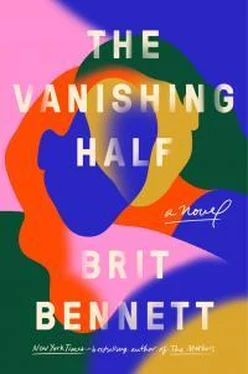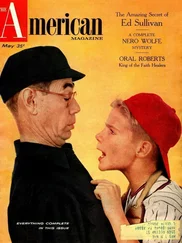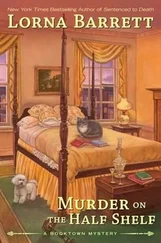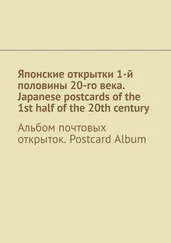“They were different,” he said.
“Different how?”
“Different from you,” he said. “All people are different, white girls too.”
He was different from anyone she’d ever known. His native language was Creole, his English inflected by his accent. He had a nearly photographic memory, so when he helped her run lines, he always learned them before she did. They’d met at 8 Ball, the dive bar where she worked. Somehow, past the burly bikers crowded around high tops, past the tattooed girls feeding the jukebox quarters to play Joan Jett, past her own attempts to blend in, they’d noticed each other. She was still trying to find her first acting gig then, and nobody understood why she’d left Los Angeles to do so. But she liked the stage. In Los Angeles, every actor she knew was obsessed with breaking into Hollywood, because anyone with sense knew that Hollywood was where the money was. But that whole process seemed like a drag. Waking up at dawn, standing in front of a camera for hours, repeating the same lines until some asshole director was satisfied. The stage was something else altogether—new every time, which terrified and thrilled her. Each show was different, each audience unique, each night crackling with possibility. The fact that there was no money in what she was doing was just a bonus. She was only twenty-four then, still romanced by the idea of her own suffering.
“I know that,” she told Frantz. “That’s why I’m asking what they were like.”
Soon she regretted asking when they began to run into his ex-girlfriends around the city. Sage the poet, who published long rambling essays about the female body that she still sent to Frantz for notes. Hannah the engineer, studying how to improve sanitation in poor countries. Kennedy had imagined a frumpy girl wading through sewage, not this perky blonde on the subway, perfectly balanced in her five-inch boots. Christina played the clarinet for the Brooklyn Philharmonic. At dinner, Kennedy stirred her creamed spinach while Christina and Frantz discussed Brahms. He was right, they were all different. She felt stupid for being surprised. Part of her had imagined that his other white girlfriends were altered versions of herself—her if she had, say, grown up in Jersey or decided, on a whim, to dye her hair red. But his taste in white girls was varied and she couldn’t decide what was worse, to be the latest iteration in a series of similar lovers or to be radically different from the ones who’d come before her. Belonging to a pattern was safe, at least; to be singular was a risk. What was it, exactly, that Frantz liked about her? How could she ever hope to keep him interested?
“What if I told you,” she said, “that I’m not white?”
She didn’t plan to say this, it just came out. Frantz smiled, his beer raised to his lips.
“What are you, then?” he said.
“Well, not full white,” she said. “I’m part black too.”
She’d never said this out loud before. She’d wondered if saying it might make it feel more real, as if something innate would awaken inside her at the sound of those words. But the admission felt phony, like she was reciting lines. She couldn’t even convince herself. Frantz squinted at her a moment.
“Ah, yes,” he said. “I see it now.”
“You do?”
“Sure,” he said. “I know plenty of Negroes with hair as kinky as yours.”
He was teasing. He thought she was kidding, and over time, it became a joke between them. If she was running late, he’d say that she was on colored people time. If she snapped at him, he’d say, “Easy there, sista.” Soon it became a joke to her too. Jude, her mother’s secret, all of it. She would know, she decided. You couldn’t go through your whole life not knowing something so fundamental about yourself. She would feel it somehow. She would see it in the faces of other blacks, some sort of connection. But she felt nothing. She glanced at them across the subway car with the vague disinterest of a stranger. Even Frantz was, essentially, foreign to her. Not because he was black, although that, perhaps, underscored it. But his life, his language, even his interests were apart from her. Sometimes she stepped inside the little closet he’d converted into an office and watched him scribble equations that she’d never understand. There were many ways to be alienated from someone, few to actually belong.
—
HER MOTHER HATED FRANTZ. She called him uppity.
“And not for the reason you think,” she said. They were sitting in the window of a café, watching all the people walk by. Her mother had flown out to visit her during her Thanksgiving break. Kennedy had insisted she couldn’t take time away from work and auditions to visit home, but really, she just wanted her mother to see her New York life. She took a perverse delight in it, like she was a child dragging her over to see the drawing she’d scribbled on the wall. Look at the mess I’ve made! Her mother had tried her best not to react. She’d kept her lips drawn tight during the grand tour of the basement apartment. Nodded quietly as Kennedy took her by 8 Ball. But Frantz was the last straw, the one part of her unacceptable life that her mother could not ignore.
“And what reason is that?” Kennedy said.
“You know.” There were two black women next to them eating croissants. Her mother would never say it aloud. “It’s not that. I just don’t like anybody who acts like him—”
“Like what?”
“Like his you-know-what don’t stink.”
She must have had the only mother in all of Brooklyn who was too polite to say the word shit in public.
“I don’t know why you don’t like him,” Kennedy said. “He was perfectly nice to you.”
“I never said he wasn’t. But he walks around like he’s the smartest person in the room.”
“Well, he is! He has a PhD from Dartmouth, for God’s sake. I always feel like a dummy around him.”
“I just don’t understand it. You never liked anyone like him before.”
In high school, she’d dated boys in studded leather jackets who wore their hair long and greasy like the Ramones. Her first boyfriend could barely see without swiping long strands out of his eyes. She’d thought it was darling but it drove her father crazy. He imagined her dating, as all fathers do, boys who reminded him of his younger self, hair shorn, sharply dressed, career focused. Not these slouchy boys she brought home, always a little baked, shy of total irreverence but near it. She dated boys in bands that played music so terribly, she could not have endured listening if not for love. She’d dated a wrestler in college and watched him run around for hours draped in garbage bags, trying to drop weight. She could never love a man who cared that much about anything, she told herself later, but here she was, living with one who jotted equations on the bathroom mirror before he could forget them.
“Well, it was time for a change,” she said.
Her bad-boy phase had ended. Her mother should have been relieved, but she only looked troubled.
“It’s not because of that girl, is it?” she said.
They hadn’t spoken about Jude in two years. But she hadn’t left them. Kennedy knew, right away, who her mother meant.
“What’re you talking about?” she said.
“Well, you never liked anyone like this before. Then that silly girl got into your head. I just hope you’re not trying to prove anything.”
She seemed so flustered, fingering the handle of her coffee cup, that Kennedy looked away. If dating Frantz had been some type of experiment, then it had failed terribly. Loving a black man only made her feel whiter than before.
“I’m not,” she said. “Come on, let’s go to the museum.”
—
THE WINTER SHE SAW Jude Winston again, Kennedy starred in an off-off-Broadway musical called Silent River . She played Cora, the sheriff’s rebellious daughter who longs to run away with a rugged farmhand. For months, she obsessed, more than normal, about getting sick. She drank so much hot tea with lemon that by February she could barely stand the smell of it and pinched her nose, gagging it down. She swallowed chalky zinc pills and triple-wrapped her neck in a scarf before stepping outside. She scrubbed her hands furiously after she climbed off the subway. She wasn’t built for a New York winter under ordinary circumstances; landing her biggest role since she’d moved to the city certainly fit the bill of extraordinary. The night she got the call, Frantz took her out to dinner. She was giddy. He was relieved.
Читать дальше












